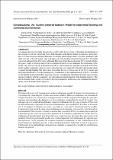Conceptualizing the Student-Centered Outreach Model for experiential learning and community transformation

View/
Publication Date
2016-12-30Author
Stephen Wamala Kalule, Walter Odongo, Katya Enos Kule, Elly Kurobuza Ndyomugyenyi, Peter Omara, Duncan Ongeng
Metadata
Show full item recordAbstract/
A dominant discourse in higher education has widely called for reviewing, redesigning and alignment of the curricula to suit the current and future skills demands in the labour market. In response, universities have over time been repositioning themselves to develop practical approaches to produce graduates with skills relevant to the job market. One such approach is the Student-Centered Outreach (S-C-O) model conceived and run at Gulu University in Uganda. However, little is known about the S-C-O model and thus this paper sought to develop and present a conceptual framework that underpins the functioning of the model. The structural set-up of the framework shows that students are centrally positioned between the faculty and the community. A key resource connecting the actors in the S-C-O model is knowledge which is gained through learning that takes place from either the top or bottom side of the S-C-O model and integrating feedback to close the learning loop. Examination of the implementation of the S-C-O model reveals that the model realizes three important outcomes: (i) enhancing experiential learning, (ii) promoting university linkage with the community, and (iii) enhancing transformation of the farming practices. The need for further studies as part of a process to develop an empirical methodology for examining the impacts of this outreach model remains apparent.
